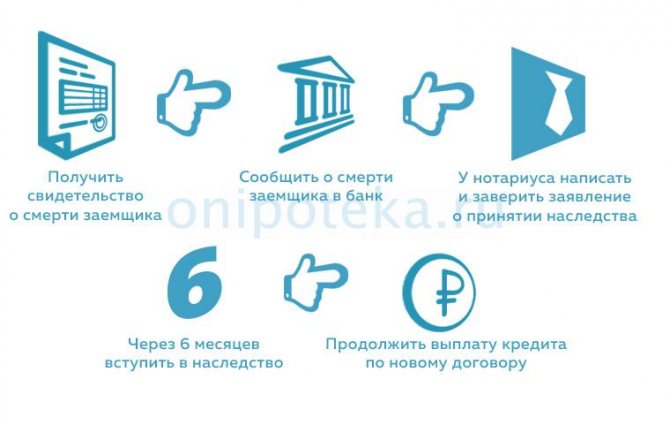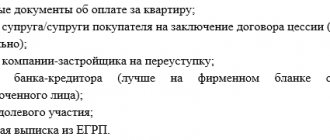Home/Mortgage repayment/Mortgage in case of death of the borrower
Mortgages are provided for a long period of time. During this period, the situation can change significantly. If the mortgage borrower passes away, the debt is not automatically forgiven. The citizen’s family will have to settle the issues with the bank. Individuals may commit to closing the debt or refuse to take action. However, in the latter case, the bank can sell the apartment and use the money to pay off the debt. If the heirs want to receive the mortgaged property after the death of the borrower, they must figure out who the debt will go to and when they should begin paying off the obligations.
Who pays the mortgage in the event of death?
If the main recipient of the mortgage passes away, the first thing you should pay attention to is the presence of insurance that protects life and health. If mortgage insurance is available, the need to cover obligations will be assigned to the insurance company. However, the rules only apply if the relevant risk has been included in the policy. Otherwise, the application for payment will be rejected.
Attention! If you have any questions, you can chat for free with a lawyer at the bottom of the screen or call ext. 157 Moscow; ext.953 St. Petersburg; +7 (800) 700-99-56 ext. 402 Free call for all of Russia.
If there is no life insurance policy for a mortgage, or the situation is recognized as not insurable, but there are heirs, the closure of the debt is entrusted to them (Article 1175 of the Civil Code of the Russian Federation). These citizens have the right to refuse to transfer debts. However, in this case the person will have to reject the inheritance completely. Receive property after the death of the mortgage borrower, but the obligation cannot be waived.
If there are several heirs, the mortgage debt in the event of the death of the borrower, like property, is divided between them in proportion to their shares in the inheritance (Article 1175 of the Civil Code of the Russian Federation). It is noteworthy that the person is liable only to the extent of the value of the property received. The bank cannot demand from a citizen an amount exceeding the established parameters.
Attention
However, the responsibility for closing obligations is not always transferred to the heir. If the second responsible party to the agreement is a co-borrower, he will have to begin providing funds (Article 325 of the Civil Code of the Russian Federation). It is not possible to refuse responsibilities.
Insurance in case of death of the mortgage debtor
Despite the fact that the law does not oblige a citizen to insure life and health, most banks refuse to issue funds or increase the severity of the conditions if the borrower refuses the policy. Therefore, usually a person is financially protected from unforeseen situations. However, the death of a citizen is not always recognized as an insured event.
First of all, you need to pay attention to the provisions of the mortgage insurance contract. Situations in which death is recognized as an insured event are described in detail here. The company representative takes into account the cause of death of the debtor. The application will be rejected if the situation arose as a result of criminal activity, driving while intoxicated, or playing extreme sports. The exact list of reasons is reflected in the agreement.
If the reimbursement application is approved, the person will receive compensation. However, cash payments are not provided. The company will transfer the required amount to the bank to close the debt on the housing loan after the death of the borrower.
If you had insurance
Today, in most banks, you can get a mortgage only if you have insurance coverage for the life and health of the borrower. If the borrower dies on a mortgage with life insurance, the insurance company pays off the loan obligations. But sometimes insurers refuse to compensate for losses, classifying the incident as a non-insurable event. As a result, the loan debt is transferred to relatives or guarantors.
Of course, for the loan recipient, insurance is an additional processing cost, and a considerable one. Moreover, a feature of insurance services is that the insurance contract is a fixed-term one, and it must be renewed annually. But it is important to know that according to this agreement, the death of the mortgage borrower is an insured event, and the legal successors can claim the participation of the insurance company in repaying the bank debt of the deceased.
One more point is important. When applying for insurance, the company often does not focus on whether the insured person has chronic diseases. But if death occurs as a result of an exacerbation of the disease, the event may be classified as non-insurable, and the debt of the deceased is not covered by the insured amount.
Therefore, heirs are advised to pay attention to the following:
- insurance companies are very vague about the indemnity obligations in the contract, and in order to achieve repayment, the help of qualified lawyers will be required;
- The insurance contract always clearly indicates non-insurance events. Most often, these include the death of the insured as a result of combat operations, which occurred while engaging in extreme sports, from chronic diseases, as a result of poisoning with alcohol, narcotic substances, or occurring in institutions of the penitentiary system. In these cases, the insurer is not obliged to make payments.
In the event of the death of the insured mortgage borrower, the heirs must:
- submit an application to the insurance company, attaching a death certificate, insurance contract, medical report on the causes of death;
- wait for the insurer's decision. If the result does not satisfy the interested party, they go to court to protect their interests.
If the insurer has decided to pay compensation to the bank, the obligation will be repaid, the mortgage will be closed, and the property will be released from collateral.
Recommended article: Is it possible to extend the mortgage approval period?
Mortgage Inheritance
A citizen has the right to independently determine his heirs. To do this, a will is drawn up. Chapter 62 of the Civil Code of the Russian Federation is devoted to the document. All the features of paper design, its legal force and nuances of application are defined here. However, in practice, a person may not have time to identify heirs. In this case, the procedure for transferring property after the death of the owner will be carried out in accordance with the provisions of Chapter 63 of the Civil Code of the Russian Federation. A legal act defines the rules of inheritance by law. They must be observed, including when receiving mortgage obligations and an apartment for which the debt has not yet been paid.
If a person claims part of the property and is ready to pay off the debt for the testator, it is necessary to contact the notary office located at the last place of residence of the property owner or location of the property. The procedure must be completed within 6 months. The period begins to be calculated from the moment of death of the testator.
The notary will read the citizen’s application, examine the documents confirming the relationship and the fact of the death of the testator, and then open the corresponding case. After 6 months, all heirs who contact the specialist will receive certificates confirming their right to property. Based on the document, it will be possible to re-register the property.
Attention
If a person plans to receive the property of the testator and is ready to repay the mortgage after the death of the borrower, it is necessary to begin interaction with a financial organization immediately after the death of the main borrower.
The procedure will be performed according to the following scheme:
- A citizen notifies a financial institution about the death of a mortgage borrower. You must provide supporting documents.
- The bank is introducing a moratorium on interest charges. The organization does not have the right to apply sanctions for 6 months (Resolution of the RF Armed Forces No. 9 of May 29, 2012). This period is necessary for registration of inheritance.
- When the established period has ended and the successor has received a certificate of inheritance, the person contacts the bank and transfers the debt to himself.
- The financial institution is preparing an additional agreement. The documents record the amount of remaining debt, the amount of overpayment, the timing of mortgage payments and the procedure for closing obligations.
Inheritance of a mortgage in the event of the death of the borrower
Heirs can be determined by a will. But if the borrower did not foresee such a situation and the death occurred unexpectedly, inheritance is carried out according to law. To do this, applicants contact a notary office and submit an application in which they assume responsibility for accepting the inheritance. This must be done within 6 months after the death of the testator.

Based on the submitted document, the notary opens an inheritance case. One copy of the application is kept in the notarial file, the second, signed by a notary, is handed over to the applicant.
In the event of the death of the borrower, the mortgage is reissued in the following order:
- it is recommended to notify the lending bank in writing about the death of the borrower and provide documents - a certificate confirming the death, a copy of the will or a notarial application for inheritance;
- The bank introduces a moratorium on the accrual of interest on the loan for a period of up to 6 months, i.e. until the heir has registered ownership of the property;
- at the end of the 6-month period, the successor contacts the lending bank and re-issues the loan debt to himself;
- The bank draws up an additional agreement, which specifies the amount of remaining obligations, the interest rate, terms and procedure for repayment - in a one-time tranche or periodic payments.
Recommended article: Is it possible to change the mortgage payment date?
It happens that family members find out about the mortgage after the death of the testator, when the lending bank notifies relatives. Who pays the mortgage in the event of the death of the borrower in such a situation is decided simply. The heirs can keep the property, re-issue the loan and regularly make payments according to the agreements. Or they refuse to repay obligations, which will mean the transfer of property to the bank, and it will be able to compensate for losses by selling the mortgaged apartment.
Who will get the mortgaged apartment in the event of the borrower's death?
Property owned by a citizen passes to his heirs. First of all, you need to pay attention to the presence of a will. In it, the person records his will regarding the disposal of property. The peculiarity of the document is that it can even identify citizens who are not close relatives. Property can be transferred to any person. However, in this situation, dependents and minor children must be allocated a mandatory share (Article 1149 of the Civil Code of the Russian Federation).
If there is no will, the distribution of property will be carried out according to law. In this case, the property goes to relatives. In the Russian Federation there are 8 lines of inheritance (Articles 1142-1145 of the Civil Code of the Russian Federation). The closer a citizen is to the testator, the higher the chance of receiving a mortgage apartment after the death of the borrower. So, the first stage includes:
- spouse;
- natural or adopted children;
- parents.
IMPORTANT
The above persons inherit first. If there are no representatives of the group, the opportunity to receive property will pass to the second or subsequent stages. In practice, there may be several heirs at the 1st level at once. In this case, property and obligations are divided between them in equal parts.
Who will pay the loan?
There are 4 options for loan repayment: relatives (heirs), insurance company, bank, guarantors. There are always nuances and pitfalls. The case when the bank recognizes the debt as bad is not taken into account, since in fact the debt will not be closed. The bank will write it off.
Repayment by the insurer

If a life insurance contract was concluded and death is an insured event, the insurance company will pay the debt. In this case, the apartment will remain the property of the state or, if there are heirs, will be distributed by inheritance.
Unfortunately, insurance companies rarely agree to pay such amounts , so these issues are often resolved through the courts.
Relatives
This option is possible if the borrower did not have guarantors for the loan and did not have a will, but there are heirs. The heirs are, first of all, close relatives (parents, children, spouses), then the second, third, etc. queues.
The order of inheritance is determined by Article 1142 of the Civil Code of the Russian Federation, Article 1143 of the Civil Code of the Russian Federation, Article 1144 of the Civil Code of the Russian Federation, Article 1145 of the Civil Code of the Russian Federation and Article 1148 of the Civil Code of the Russian Federation. If a will has been drawn up, the heirs are the persons indicated there.
Article 1148 of the Civil Code of the Russian Federation. Inheritance by disabled dependents of the testator
- Citizens who are classified as heirs according to the law specified in Articles 1143 - 1145 of this Code, who are disabled on the day of the opening of the inheritance, but who are not included in the circle of heirs of the line that is called for inheritance, inherit by law together and on an equal basis with the heirs of this line, if not less than a year before the death of the testator were his dependents, regardless of whether they lived together with the testator or not.
- Legal heirs include citizens who are not included in the circle of heirs specified in Articles 1142 - 1145 of this Code, but were disabled by the day the inheritance was opened and were dependent on him for at least a year before the death of the testator and lived together with him. If there are other heirs by law, they inherit together and on an equal basis with the heirs of the line that is called for inheritance.
- In the absence of other heirs by law, the disabled dependents of the testator specified in paragraph 2 of this article shall inherit independently as heirs of the eighth order.
The heirs must repay the borrower's debt according to the same schedule as the borrower. The bank has no right to demand from the heirs an amount of payment greater than the amount of the inheritance. For example, if a daughter inherited a third part of an apartment with a total value of 500 thousand rubles, then the bank cannot require her to pay a debt of more than 500,000 rubles.
If you refuse the inheritance, there will be no obligation to repay the loan. The waiver must be notarized.
Guarantors
If the agreement specifies specific guarantors for the loan, the debt of the deceased will be transferred to them. They will be required to repay the loan until it is fully repaid. The bank has the right to go to court if the guarantor refuses to pay.
The court may decide that the guarantor's own property must be given in payment of the debt.
Bank

If there are no guarantors, heirs, or they decide not to enter into an inheritance, and the insurance company refuses to pay the debt, the bank takes the collateral apartment.
Within a month, such an apartment must be sold at auction.
The cost of the apartment will not exceed its market price.
For the bank, in this case, the main thing is to repay the principal debt.
For a bank, the death of a borrower who took out a mortgage is almost never a problem. The only time when the bank will not return its money is if minors or disabled people are registered in the apartment, and this is their only home.
In other situations, the bank will return at least part of the debt. For relatives, in addition to psychological loss, the death of a loan borrower can result in a number of problems.
Not everyone has the ability to pay a large loan every month. In this case, it is better for relatives to refuse the inheritance.
When do co-borrowers pay the mortgage after the borrower's death?
Banks usually insist on attracting co-borrowers. For a financial organization, this is an additional guarantee of timely fulfillment of obligations. If the primary beneficiary of the funds passes away and the heirs refuse to repay the debt, the need to provide funds will fall on the co-borrower. It is not possible to refuse obligations.
Typically, wives, children, husbands, brothers and sisters of the recipient of funds act as co-borrowers. It is acceptable to attract one or several co-borrowers. The rights and obligations of persons are fixed in the mortgage agreement.
Attention
If the person acting as a co-borrower is not a relative, and the heirs after the death of the main borrower are ready to repay the obligations, a joint settlement of the mortgage is acceptable. When the debt is repaid, the property will be divided.
Debt after the death of the borrower
To whom the obligations of the deceased borrower are transferred depends on the presence of heirs, as well as the terms of the loan agreement. The resolution of the situation could be like this:
- there are heirs who take ownership of the property, declared by a will or declared by law. After the death of the borrower, the mortgaged apartment will also be included in the total amount of inherited property;
- When registering, the income of the co-borrowers is taken into account, one of which is the title borrower, who is the spouse. After the death of the main borrower, the co-borrowers assume the responsibility to repay the loan;
- the debt will be repaid by the insurance company if it is recognized that the death of the borrower is an insured event;
- if there are no legal successors, the mortgaged apartment is transferred to the disposal of the bank, and then transferred for sale at open auction by court decision.
Sometimes creditor banks write off the debt as hopeless for repayment if the mortgaged property passes to incapacitated relatives or heirs with disabilities, for whom the mortgaged apartment is the only living space.
Separately, it is worth dwelling on minor legal successors living in mortgaged housing. Before reaching the age of majority, the creditor does not have the right to take any actions with the living space or demand payment of the obligation. But after reaching the age of majority, and the loan terms are not completed, the bank has the right to demand that the heir repay the debt.
Recommended article: Tax deduction when buying a second apartment
If a dispute arises over who pays the mortgage in the event of the borrower’s death, the court will ensure the protection of the interests and rights of the parties.
When does the bank pay the mortgage after the death of the debtor?
The bank will not write off or independently pay off the mortgage for a client after death. If there are no co-borrowers, the situation is not recognized as an insured event, and the heirs refuse to receive obligations, the financial organization initiates legal proceedings, during which they consider the possibility of selling the apartment and using the proceeds to pay off the mortgage debt. In most situations, the company's requirements are satisfied. As a result, the apartment will be sold, and the proceeds will be used to pay off the debt.
Rights of the guarantor
Often one of the conditions for issuing a mortgage is the mandatory involvement of guarantors. Unlike co-borrowers, persons acting in this role cannot claim part of the property purchased on credit. However, guarantors bear full responsibility under the contract if the main recipient of funds for some reason can no longer continue to fulfill obligations (Article 363 of the Civil Code of the Russian Federation).
If the person who took out the mortgage dies, the possible consequences depend on the specifics of the situation. When the borrower changes and the heir begins to act in his capacity, the liability of the guarantor can be retained. Such measures are applied only if the person agrees to bear responsibility, or the contract states that it does not disappear even if the borrower changes.
IMPORTANT
In practice, a person may not have any heirs, or they have formalized a refusal to accept obligations under the mortgage and property. In this case, the property passes to the state. The guarantor has the right to refuse the obligations assumed.
Rights of the guarantor after the death of the borrower
To guarantee that the creditor bank will receive the money given to the borrower for a mortgage, often one of the conditions of mortgage programs is the provision by the borrower of a guarantor - a person who agrees to be responsible for the borrower’s actions in repaying the mortgage. But what happens if the borrower passes away, then the guarantor has some responsibilities?
It all depends on whether an heir to the property appears or not:
- if the borrower changes (the new borrower is the heir of the deceased borrower), then the guarantor’s liability will be retained only if he personally agrees to be responsible for the new borrower or if the current mortgage agreement states that the guarantor is obliged to be responsible for any new borrower;
- if the deceased borrower has no heirs or they refused to accept the inheritance, then all of his property, including the mortgaged housing, passes to the state. In this case, the guarantor may refuse the guarantee if he considers it necessary.
Mortgage in case of death of one of the spouses
If the borrower is in a formal relationship, his spouse will act as a co-borrower. In addition, a person is considered a first-degree heir. If a couple has minor children, the parents represent their interests. When a person passes away, the responsibility for closing obligations to the bank will pass to the husband or wife of the recipient of the funds. Usually the calculation scheme does not change. However, a citizen can contact the bank to review the terms of closing mortgage obligations in the event of the death of the borrower. The action is carried out at the time of loan renewal.
Military mortgage in case of death of a serviceman
Military mortgages are provided in compliance with the provisions of Federal Law No. 117 of August 20, 2004. If a soldier dies, there are three possible outcomes:
- There was insurance. If the case is recognized as insured, the company will independently pay off its obligations to the bank. As a result, the serviceman's family will not have to make payments. The heirs will receive the apartment.
- An agreement will be drawn up with the heir, who will assume the obligations for the loan. If there are savings left on the personal account of an NIS participant that belong to this person, the state will continue to close the obligations. However, if the amount is not enough, the heir will have to pay the balance of the mortgage debt himself after the death of the borrower.
- There will be a one-time repayment of the debt. To do this, the citizen must provide the required amount.
For your information
, relatives can decide whether they want to use contributions from Rosvoenipoteka or pay off the obligations themselves.










